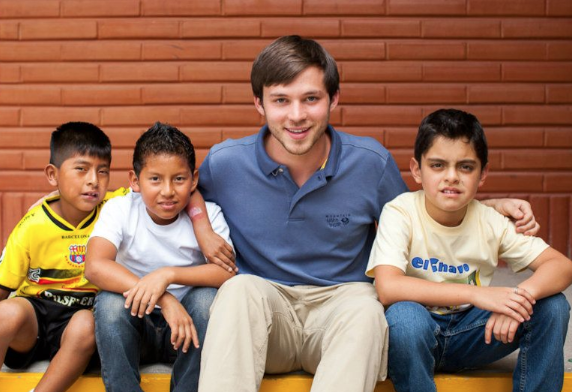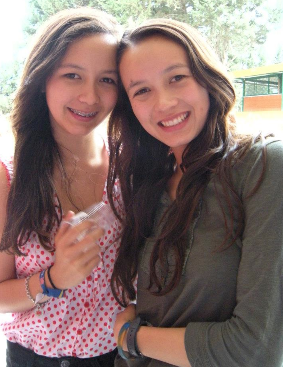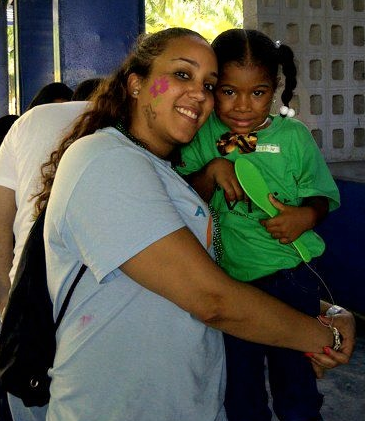
Living with a chronic illness is, for the most part, seen as a detriment. And without question, after living with Type 1 diabetes for 41 years, I'd give it up if I could.
The five daily injections and 10 finger-pricks on average I do each day. The heart-stopping moment when something goes wrong and I fear it's diabetes-related. The never-ending decision-making about everything I do -- eat, walk, get on the subway, wait for my delayed flight with no food, go into a meeting or a movie -- trying to prevent complications from high blood sugar over time, or losing consciousness at any time from low blood sugar -- if low enough it can kill me on any ordinary day.
Yet I titled this "How Illness Can Make Us Better" because it can. Living with illness can also provide opportunities to turn "bad" into "good." Illness bestows for many, and perhaps particularly for young people, deeper wells of compassion, maturity and the desire to make a difference in the world.
Three AYUDA volunteers who spoke with me when I was writing my previous post "Small Diabetes Organization AYUDA Teaches Self-Care and Social Change" have already, at a tender age, used what others would consider an impediment -- their diabetes or their proximity to diabetes -- to change the lives of those less fortunate than themselves and inspire hope in places where hope is scarce.
As AYUDA's elite squad, they have cheered, rallied, role-modeled, touched, taught and brought much for a healthier life to youth with Type 1 diabetes in Latin American countries where poverty is high and health education is low.
Here are excerpts from their stories and a look at how chronic illness can, in some ways, make us better.
Sam Wohns, 22 years old, always had a well-developed social conscience, but AYUDA gave him a stage.

Photo by c+ncreative.com
When Sam was 10 years old, his parents gave him a book on world geography. On the last page was a spinner and whatever country the spinner landed on you had to answer the question, "How many calories do people there eat every day?"
"I learned that many young people live on less than 900 calories a day," Sam told me. "So the next day I only ate 900 calories of rice. As an act of solidarity."
Sam signed up as a volunteer with AYUDA the week after his diagnosis of Type 1 diabetes at 17:
I knew having Type 1 diabetes here wouldn't change what I could do with my life. I also knew in lesser-developed countries it could be life-threatening due to limited access to supplies and education. I saw that as an injustice and I wanted to do something about it.
In Ecuador, there isn't a single pediatric endocrinologist or nurse educator, so AYUDA's peer-education model is invaluable. It is not just about sending supplies.
I met a little girl there who could only test her blood sugar once a day and she ran out of strips four days before diabetes camp. She was excited to come to camp, but then her grandmother backed out because it would require her to miss work. We really felt this would negatively impact the girl's life, so a group of us drove to their home, several hours away, and were able to persuade the grandmother to come.
At camp, she met other parents and grandparents caring for children with Type 1. She learned a great deal to help her care for her granddaughter. Before, she didn't even know how to administer insulin. That's just a small example of how we saw a need and built a relationship to help address it. We can't solve every problem, but we made a difference to that family.
Sam is studying social movements of Latin America at Harvard.
17-year-old identical twins Isabel (has Type 1 diabetes) and Madeline Chin

Madeline says she's always had the luxury of doing something positive without having to live with diabetes like her sister. Together they've done advocacy work, a public service announcement, helped children and participated in AYUDA. "It's always been important to me to be an advocate for diabetes," said Madeline, "even though I don't have the disease myself."
To participate in AYUDA the girls each had to raise $5,500 to cover their expenses. A sizeable sum, Madeline said they never doubted they could do it. They spent their summer writing letters to family and friends, conducting email campaigns and sourcing funds through Facebook.
"The best part of the experience for me," said Isabel, "was being able to relate to the kids as a diabetic. It wasn't just about teaching them, but seeing them get so excited about being together with others who had diabetes and take control of their lives. Every night at dinner a new boy or girl would give himself his first shot. We were so excited to be part of it."
"What stays with me,' said Madeline, "was while we were reflecting at the end of camp about what went wrong, Merith [director of international operations] said none of it really mattered because even though we couldn't see it right away, the work we were doing was making a difference in people's lives and to the diabetes community in Ecuador."
Both girls are planning to pursue public health when they head off to college next year.
Vanessa Larco, 24 years old, doesn't have diabetes

Vanessa's long had diabetes in her family. Her mother, a doctor, has a diabetes clinic in Haiti where Vanessa grew up. "My parents and my grandfather always talked about helping others and sharing what you have," said Vanessa.
"Being in the Dominican Republic really opened my eyes, in a good way. I saw the kids rally around the international volunteers. They saw how well they were living with their diabetes it made them feel better about themselves. The parents, seeing people who've lived with diabetes for decades, thought maybe my child will be okay. There's a stigma attached to diabetes, but after seeing the volunteers they didn't think that way anymore."
"This experience changed me. Before, I helped people because that's how I was raised. But I feel like I've become a better person, that it's really in me now. Every time I talk about my experience, or just remember the kids smiling, I can't keep from smiling."
Vanessa's already told her company she's going back again next year.
I won't tell you living with a chronic illness is easy. I won't tell you it isn't isolating or a burden, or that it doesn't come with struggle at times. But it can also offer the opportunity to live life more fully, more compassionately, with greater purpose, empathy, appreciation and pride.
Or as Sam said, "the opportunity to make a huge impact and change lives, including your own."
Sam, Madeline, Isabel and Vanessa also prove being a change leader has no age limit. This is number 18 in my series on diabetes change leaders.

For more on my talks with Sam, Isabel and Madeline, click here.
For more by Riva Greenberg, click here.
For more on diabetes, click here.
Check out Riva's new book, Diabetes Do's & How-To's, along with her other books, 50 Diabetes Myths That Can Ruin Your Life and the 50 Diabetes Truths That Can Save It and The ABCs Of Loving Yourself With Diabetes. Riva speaks to patients and health care providers about flourishing with diabetes. Visit her website DiabetesStories.com.